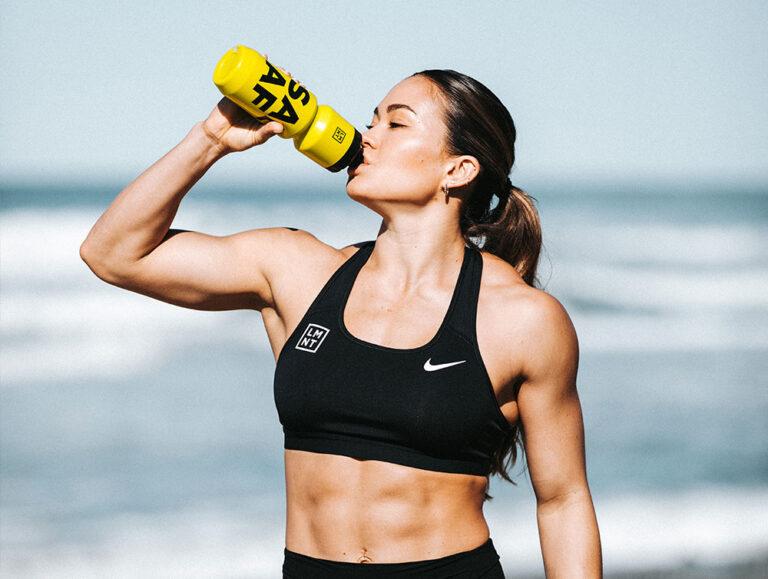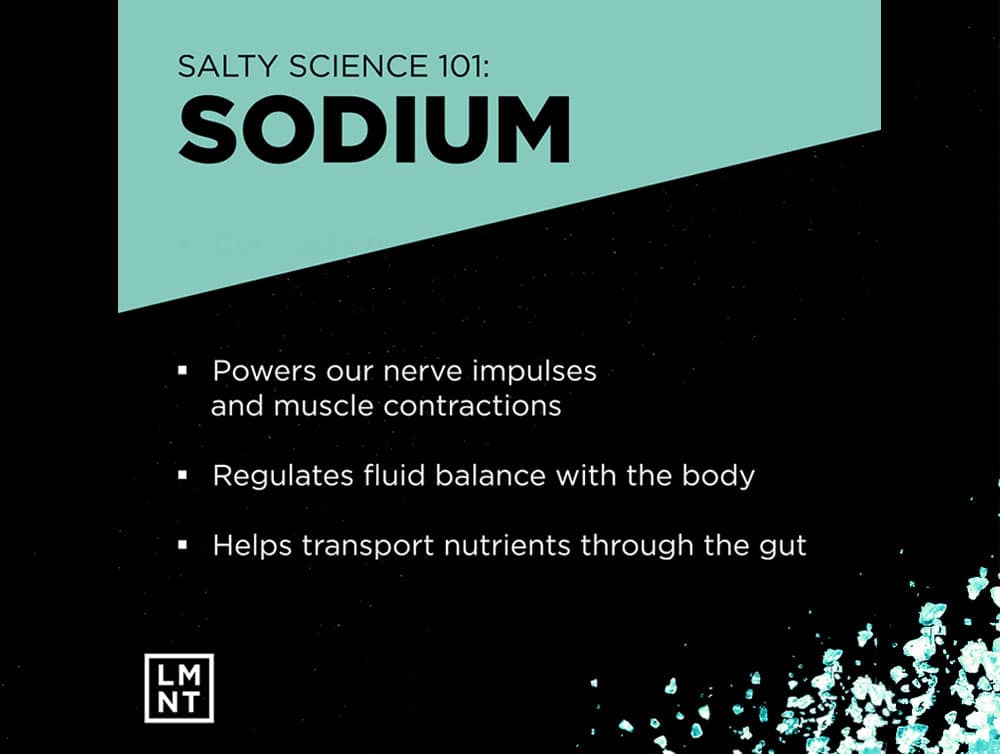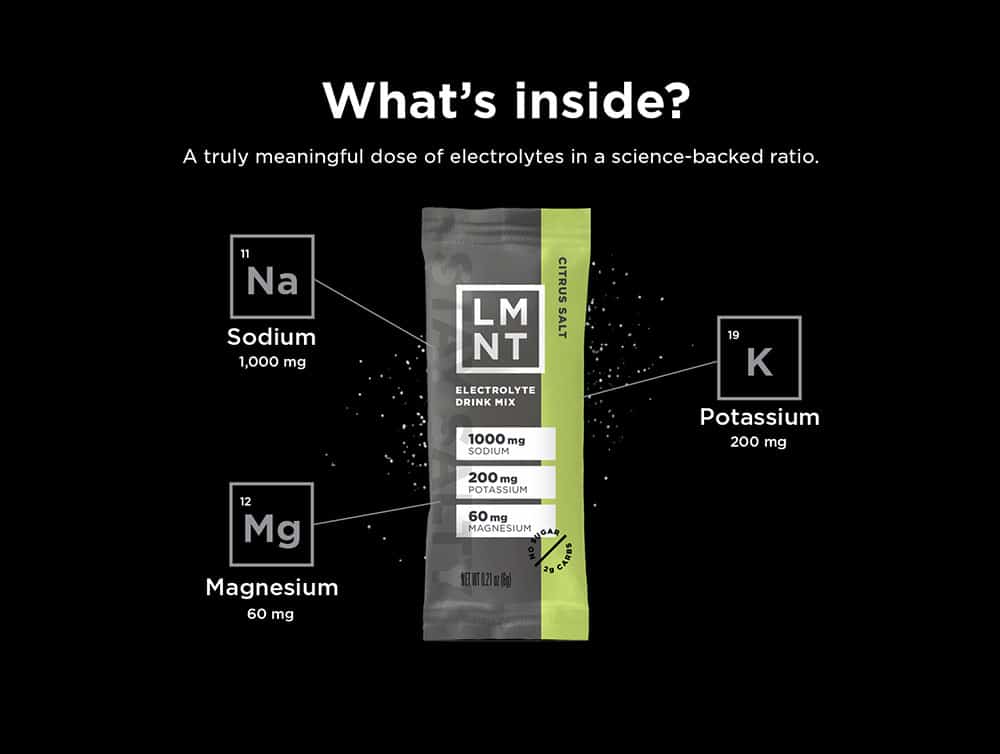
I’m a huge fan of fasting, which is precisely why I wrote an entire book on the subject.
The problem is many people don’t know how to fast correctly.
Yes, fasting includes abstaining from food for several hours (or even days), but that doesn’t mean your body stops requiring nutrients—specifically electrolytes.
Confused? Yeah, I don’t blame you. But that’s why we’re here, so listen up; I’m about to explain how you can get the nutrients you need to optimize (and not derail) your fast. Here we go.
What Are Electrolytes?
Electrolytes are minerals your body uses to regulate its electrical currents, water balance, and more. The primary electrolytes in your body include sodium, calcium, potassium, chloride, phosphate, and magnesium[1].
Electrolytes have a hand in almost all bodily functions, including[2][3][4]:
- Maintaining intracellular and extracellular fluid
- Conducting electrical charges within your body
- Regulating muscle contraction
- Strengthening muscles and bones
- Regulating pH
- Transmitting nerve signals
- And more
Why Electrolytes Can Make or Break a Fast
So, what do electrolytes have to do with fasting?
First, it’s important to understand that when you stop feeding your body, it doesn’t mean your metabolism and physiological functions shut off. In fact, the whole purpose of fasting is to give your body a chance to do something else with its energy other than digest food. Therefore, cutting back on dietary intake actually upregulates several processes in your body that increase physiological activities – some of which cause a loss of electrolytes.
For example, the fasting process increases the production of energy molecules known as ketones. If you’re unfamiliar, ketones come in after several hours of fasting to replace glucose as your primary fuel source. However, if you’re new to fasting, your body may take some time before it can use ketones efficiently, which means that initially, you’ll lose quite a few ketones in your urine.
Ketones are anions (meaning they have a negative charge), and as you lose them via kidney excretion, they like to take cations (positively charged molecules) with them. Guess which two cations are their favorites? Sodium and potassium[1].
This means that when you begin your fasting journey, you need extra potassium and sodium to level off your electrolyte balance.
Another physiological shift that happens during fasting is a natural reduction in insulin. As your body shifts from using glucose to ketones in the fasted state, insulin is no longer necessary to manage your glucose levels, which means you’ll find a lower amount of this hormone in your blood. Due to the relationship between sodium and insulin, sodium is lost via your kidneys as insulin levels drop. That’s a double-whammy for sodium[5][6].
As your electrolytes become imbalanced, it can create a range of unpleasant symptoms, often termed “keto flu.” Keto flu symptoms can make fasting feel like trudging through mud instead of giving you the lift in energy that it’s meant to. Some common keto flu symptoms include[7]:
- Headache
- Fatigue
- Nausea
- Dizziness
- Brain fog
- GI discomfort
- Constipation
- Diarrhea
- Body aches
- Low appetite
- Insomnia
- Increased thirst
- Muscle soreness or weakness
- Depressed mood
Pretty demoralizing, right?
Well, here’s the good news; if you want to avoid keto flu and soar through your fasting periods with ease, all you need is the right balance of electrolytes to keep you steady.
Finding The Right Electrolytes For You
While you can get a good portion of your electrolytes through your diet, eating food isn’t an option when fasting. Furthermore, due to the depletion of our soil quality, electrolytes tend to be low in most of our foods anyway. This is why every fasting regimen should come with a side of electrolyte supplements.
But which one do you pick?
Today, there are hundreds of electrolytes on the market, each claiming to have the ideal ratio of minerals. Unfortunately, most of them are either looking at faulty research, no research, or they’re just throwing some electrolytes into a mix with a hefty dose of sugar and preservatives. So here are a few points to keep in mind when looking for electrolyte supplements:
Avoid Products That Contain Sugar
If you’re trying to get electrolytes in while you fast, it’s a good idea to make sure that your product doesn’t contain any unnecessary calories, especially calories coming from sugar. Many electrolyte companies add sugar to enhance flavor and boost energy (for athletes), so keep an eye on your ingredient labels.
Look For Supplements That Contain Sodium, Potassium, and Magnesium
First and foremost, and this may come as a shocker, if you’re fasting regularly, you probably need much more sodium than you’re getting in your diet.
Why?
As you already learned, the process of fasting naturally increases your sodium loss. And while many health professionals today will tell you that you’re likely already consuming too much sodium, the truth is that less sodium is not necessarily a good thing. In fact, the Framingham Offspring Study found that lower levels of sodium (less than 2.5 grams per day) were actually linked to higher blood pressure than higher levels of sodium[8].
Furthermore, research examining 48 global populations found no link between sodium intake and blood pressure[9]. With this in mind, the natural sodium loss that comes with fasting may put you at risk for blood pressure issues, so prioritizing this electrolyte is crucial for anyone trying out the fasting lifestyle.
Potassium is another electrolyte that’s naturally lost with fasting, especially in the beginning, so you’ll want to ensure you’re getting enough potassium to replete your body while also balancing out your sodium. And finally, magnesium is an electrolyte mineral already known as a “nutrient of concern” in the US due to our generally low intake through diet[10].
Steer Clear Of Fillers
It’s shocking to look at the ingredient list on some of the most popular electrolyte mixes. Why are there 40 ingredients when you only need a handful of nutrients? Many companies add weird preservatives and fillers to their products to extend shelf life and make them taste better – good for sales, not good for your body.
Takeaway
Electrolytes are essential nutrients that your body needs whether you’re fasting or not, but they can absolutely make or break your fasting experience. As your body goes to work to clean up cellular debris and keep you feeling at your best, it runs through electrolytes like nobody’s business, so make sure you’re replenishing these precious nutrients regularly.
My personal go-to for electrolytes is LMNT. This company not only loads you up with sodium but they also include a perfect balance of potassium and magnesium. And, of course, they include zero sugar and fillers, which means you get a clean product that’s optimized for fasting. It’s truly a gem among the electrolyte supplement chaos.
If you’re interested in trying them out, they’ll send you a free sample pack of each of their eight flavors with your first order when you follow this link.
References
- https://www.ncbi.nlm.nih.gov/books/NBK541123/
- Stedwell, Ray E., Kevin M. Allen, and Louis S. Binder. “Hypokalemic paralyses: a review of the etiologies, pathophysiology, presentation, and therapy.” The American journal of emergency medicine 10.2 (1992): 143-148.
- https://my.clevelandclinic.org/health/diagnostics/21790-electrolytes
- Shrimanker, Isha, and Sandeep Bhattarai. “Electrolytes.” (2019).
- DeFronzo, R. A. “The effect of insulin on renal sodium metabolism: a review with clinical implications.” Diabetologia 21 (1981): 165-171.
- Sigler, M. H. “The mechanism of the natriuresis of fasting.” The Journal of Clinical Investigation 55.2 (1975): 377-387.
- Bostock, Emmanuelle, et al. “Consumer reports of “keto flu” associated with the ketogenic diet.” Frontiers in nutrition (2020): 20.
- Moore, Lynn L., Martha R. Singer, and M. Loring Bradlee. “Low sodium intakes are not associated with lower blood pressure levels among Framingham Offspring Study Adults.” The FASEB Journal 31 (2017): 446-6.
- Intersalt Cooperative Research Group. “Intersalt: an international study of electrolyte excretion and blood pressure. Results for 24 hour urinary sodium and potassium excretion.” BMJ: British Medical Journal (1988): 319-328.
- https://ods.od.nih.gov/factsheets/Magnesium-HealthProfessional/













